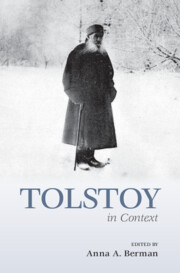Book contents
- Tolstoy in Context
- Tolstoy in Context
- Copyright page
- Contents
- Figures
- Notes on Contributors
- Preface
- Acknowledgments
- Note on Citations, Translations, and Transliterations
- Chronology
- Part I The Man
- Part II Russian Social and Political Contexts
- Chapter 5 Peasants and Folklore
- Chapter 6 The Great Reforms
- Chapter 7 Nobility and the Russian Class System
- Chapter 8 The Russian Orthodox Church
- Chapter 9 Law
- Chapter 10 Politics
- Chapter 11 War and the Military
- Chapter 12 Tolstoyans
- Chapter 13 Clothing
- Chapter 14 The “Woman Question”
- Chapter 15 The Family
- Part III Literature, the Arts, and Intellectual Life
- Part IV Science and Technology
- Part V Beyond Russia
- Part VI Tolstoy’s Afterlife
- Suggested Further Reading
- Index
Chapter 15 - The Family
from Part II - Russian Social and Political Contexts
Published online by Cambridge University Press: 05 January 2023
- Tolstoy in Context
- Tolstoy in Context
- Copyright page
- Contents
- Figures
- Notes on Contributors
- Preface
- Acknowledgments
- Note on Citations, Translations, and Transliterations
- Chronology
- Part I The Man
- Part II Russian Social and Political Contexts
- Chapter 5 Peasants and Folklore
- Chapter 6 The Great Reforms
- Chapter 7 Nobility and the Russian Class System
- Chapter 8 The Russian Orthodox Church
- Chapter 9 Law
- Chapter 10 Politics
- Chapter 11 War and the Military
- Chapter 12 Tolstoyans
- Chapter 13 Clothing
- Chapter 14 The “Woman Question”
- Chapter 15 The Family
- Part III Literature, the Arts, and Intellectual Life
- Part IV Science and Technology
- Part V Beyond Russia
- Part VI Tolstoy’s Afterlife
- Suggested Further Reading
- Index
Summary
As Russia went through an age of great reforms during Tolstoy’s adult years, relations between spouses, parents and children, siblings, and extended kin all evolved to match their changing society and its ideals. While Tolstoy was well aware of the debates about the state of the Russian family that raged at mid-century, his critique of the family talked past that of many of his contemporaries to focus on the moral issues closest to his heart. By mid-century many people considered the Russian family to be a backward institution based on patriarchal tyranny. Jurists struggled to rewrite imperial family law, while figures across the political spectrum debated the “Woman Question.” Tolstoy’s views evolved along different lines. He went from idealizing the traditional patriarchal family (through the 1860s), to acknowledging its flaws (1870s), to rejecting the family as an ultimate life goal (1880s onward). His ultimate ideal left no place for sexual love and was based on impersonal service to a higher cause. Ignoring all the quotidian realities of actually belonging to a real family made of real people, Tolstoy infuriated his wife with his abstract talk of living for the soul, while she managed the household and oversaw their large family.
- Type
- Chapter
- Information
- Tolstoy in Context , pp. 119 - 126Publisher: Cambridge University PressPrint publication year: 2022

